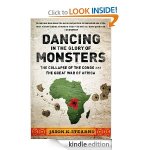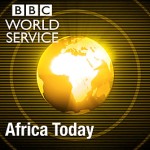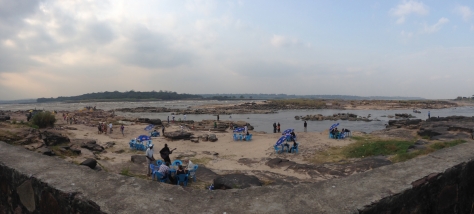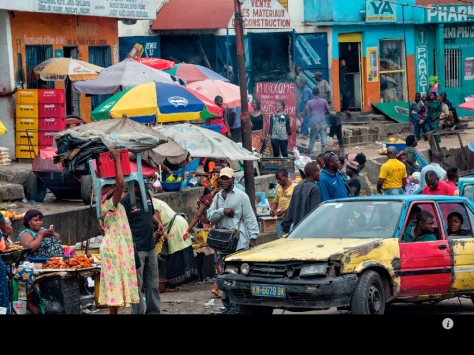This week’s news from Africa has been swamped with reports from the shopping mall in Nairobi, and for good reason. But it’s a little strange being in a place like Kinshasa, known for its crime and seething unpredictability, and to still feel every bit of the continent away from Nairobi, about 1500 miles as the stork flies. That’s to say, I feel safe here.
Violence of the sort that killed 67 people and counting is at once both targeted and random. Targeted (in my uneducated opinion – about East African culture and politics any way) in that it was a direct attack on a city in the ancestral homeland of the U.S.’s president, though you could certainly argue that the aims of perpetrators were lost on the former occupiers of the corpses pulled out of the Westgate mall. And random, in that, for all I know as an ordinary citizen, this sort of violence could strike anywhere, and to try and avoid it is tantamount to subsisting inside a bubble.
Terrorism of this ilk is not particular to the African continent. Folks in London, Madrid and the Washington Navy will say asmuch. And based on my experience, after living a couple years in Niger, traveling overland across West Africa, and now settling down for a year or so in the Congo, sub-Saharan Africa is no more dangerous than most other parts of the world…if you’re not from here.
If you are from here, if you are born in Africa, the story’s very different. As they say, statistics don’t lie and it’s dangerous to be an African, especially a child or a woman. Certainly violence plays a part in that, though it’s not typically of the headline-commandeering sort that al-Shabbal aimed for and successfully garnered in Kenya. Add to that malaria, diarrheal disease, infections – all of which we visitors can more or less avoid with the proper preparation – and you’ve got daily death totals that dwarf whatever the final toll will be in Nairobi.
Disparity in standards of living is fodder for another discussion. An important, if tertiary, lesson that comes to my mind regarding the Nairobi bombing is that what’s different about these sorts of events, when they happen in Africa instead of Europe or North America, is the utter lack of understanding we in the West seem to have about why they happen. I cannot comment on the underpinnings of what Nairobi has just experienced. I haven’t yet been to Kenya, and don’t know much about what goes on there, other than what I read in the newspapers.
I am thankful, however, that for Congo at least, some good writers have had a lot to say. So, here’s my (of course-incomplete) reading list. Most of it pertains to what is today the Democratic Republic of Congo and what’s been known variously as Zaire, the Belgian Congo, and the Congo Free State in the last century or so. Conspicuously absent are writers of African origin, and that’s due mostly to my own shortcomings, namely my lack of fluency in Kiswahili, Kiluba, and Lingala, and I’m a year or more away from being able to digest written French adequately. But it’s a start.

King Leopold’s Ghost: Required reading as far as I’m concerned for anyone hoping to understand sub-Saharan Africa today, not to mention colonialism, corporatization, megalomania and racism. Adam Hochschild deftly juxtaposes the stories of Belgium’s Machiavellian king and the man he chose to be his muscle in a colony about 80 times larger than his own country, against the quiet stirrings of a humanitarian movement, a precursor the American Civil Rights Movement, that was among the first to question how colonized people were treated.

In the Footsteps of Mr. Kurtz: Few reporters have the African bona fides that Michela Wrong can boast. In this dissection of Joseph Mobutu’s 32-year reign in the Congo, she ties together the interconnections of colonialism, African independence, greed, the Cold War, and foreign aid that conspired to make perhaps the world’s most resource-rich country (DRC) also one of its poorest. And few players – from the CIA to the World Bank to the International Monetary Fund – make appearances in the book and exit with their reputations untarnished. Yes, Mobutu was the quintessential kleptocratic African dictator, but he had plenty of help along the way.

We wish to inform you that tomorrow we will be killed with our families: It’s been a while since I’ve read this book on the Rwandan Genocide, but everyone I talk to says that to understand Congo today, especially the violence around Lake Kivu, you have to learn about the genocide that occurred just across the border. The million Rwandans who died in 1994 represent only a piece in this puzzle. Narrow in its focus, this book lays out what happened – and didn’t happen, in terms of help from the rest of the world – over those horrific 100 days.
 Africa’s World War: Congo, the Rwandan Genocide, and the Making of a Continental Catastrophe: Unfortunately, I’m still working on this one. Dense and meticulous, it’s footnoted like an academic tome, but I’ve found the level of detail and analysis fascinating. The well-respected French author, Gerard Prunier, also wrote a book specifically about the genocide (also still on my “To-Read” list).
Africa’s World War: Congo, the Rwandan Genocide, and the Making of a Continental Catastrophe: Unfortunately, I’m still working on this one. Dense and meticulous, it’s footnoted like an academic tome, but I’ve found the level of detail and analysis fascinating. The well-respected French author, Gerard Prunier, also wrote a book specifically about the genocide (also still on my “To-Read” list).
 Dancing in the Glory of Monsters: I haven’t read this one yet either, but Jason Stearns (the author) writes the definitive blog (in English, anyway) on Congolese politics called Congo Siasa. The writing can be a bit tedious, but he provides excellent perspective and context on what’s happening in this country, particularly in the east.
Dancing in the Glory of Monsters: I haven’t read this one yet either, but Jason Stearns (the author) writes the definitive blog (in English, anyway) on Congolese politics called Congo Siasa. The writing can be a bit tedious, but he provides excellent perspective and context on what’s happening in this country, particularly in the east.
 Spillover: This is a bit of an indulgence on my part, as it’s not specifically focused on the Congo. The book covers about 10 zoonoses – that is, disease we humans can catch from animals in a globetrotting detective adventure. But in a section of the book, science writer David Quammen, in what I heard he himself describe as “fiction envy,” imagines beautifully how HIV might have made the leap from apes to humans in early 20th-century Congo.
Spillover: This is a bit of an indulgence on my part, as it’s not specifically focused on the Congo. The book covers about 10 zoonoses – that is, disease we humans can catch from animals in a globetrotting detective adventure. But in a section of the book, science writer David Quammen, in what I heard he himself describe as “fiction envy,” imagines beautifully how HIV might have made the leap from apes to humans in early 20th-century Congo.
I’d be remiss if I didn’t mention Jeffrey Gettleman‘s recent profile of Rwanda’s president, Paul Kagame. It’s a 3-dimensional portrait of a man who many in the West would remain neatly flat to the rest of the world. Much of Gettleman’s work as the New York Times’ East Africa bureau chief has been stellar.
 One of the best sources of African news, often reported by African journalists, is the 15-minute daily podcast, BBC’s Africa Today.
One of the best sources of African news, often reported by African journalists, is the 15-minute daily podcast, BBC’s Africa Today.
So, what did I miss? What other good books are out there about sub-Saharan Africa?










You must be logged in to post a comment.